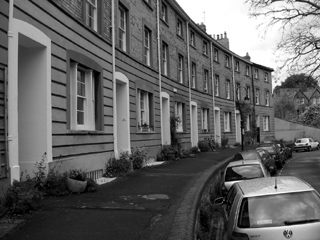My mother kindly sent me another book today: Thomas Friedman’s The World is Flat: A Brief History of the Twenty-First Century. I’ve heard a bit about it before, but remember virtually nothing of what was said. As I recall, The Economist was quite critical, but they don’t seem to have a great deal of patience when it comes to a number of alternative views about globalization. Once I finish On the Road and The Skeptical Environmentalist, I look forward to going through it as the next object of discretionary reading.
Aspects of today’s Environment Centre colloquium were quite good. I enjoyed the Vancouverite atmosphere, as well as the presentation by Guardian columnist George Monbiot. Particularly impressive were his historical asides, though his main argument came off as a bit of an afterthought. Spending time with so many people doing environmental studies was a reminder of just how completely outside the discipline I really am. The contrast in the kind of discourse that took place there and the kind in our various seminars was considerable. I’ve never heard the term ‘environmentalisms’ so many times in one day. Some of the presentations struck me as interminably long, lacking in direction, and somewhat pointless: especially one in which the presenter literally skimmed through a 16 page Microsoft Word document he had on screen, correcting the spelling of words as he went, and making general comments about what was written.
The event at Rhodes House was informative but largely unsurprising – except where it was dramatically punctuated by the thunderstorm that materialized as it was ongoing. I had seen two of the speakers before, at a previous Global Environmental Governance seminar, and the presentations they gave were quite similar to those I saw before. I did enjoy the presentation on AIDS by Mandisa Mbali, a Rhodes scholar and organizer of the Stop AIDS Society at Oxford.
- Meeting Taylor Owen, a fellow Oxford blogger, both at the Environment Centre event and, subsequently, after the Africa panel was good fun. Speaking with someone else who went to UBC – and who has a number of unexpected connections to Emily as well – is a reminder of how small a place Canada can be.
- Likewise, I enjoyed Mandisa Mbali”s presentation on HIV/AIDS: delivered as part of the aforementioned Africa panel at Rhodes House. Tomorrow, I am going to an event being run by the Stop AIDS Society at 8:00pm tomorrow at Hollywell Manor, one of the buildings owned by Balliol College.


It seems that George Monbiot has a WordPress blog of his own.
So it appears.
I enjoyed his way of speaking, as well as his unusual argument. It’s not one I’d ever heard before, which is rare. He spoke about the creation of wilderness, basically through the (often forceful) exclusion of people who used to live there and rely upon it. In a very ‘social green’ vein, he disputed the idea that there is inherent value in pristine wilderness. At least, value that justifies the costs associated with excluding people from it.
Examples he gave included national parks in Kenya, as well as Yellowstone: the place that apparenty became “America’s Eden” only after the tribes that lived there before were pushed out.
If it means anything, my roomate is reading The World is Flat right now and says that it is very good. Of course, that is coming from a philosophy/psychology student, not a polisci student!
:)
Lindi,
Thanks for the information. Tha major complaint I’ve heard about it is that it is overly anecdotal and doesn’t have a strong enough central argument. I will put up my own review after I read it.
Milan,
The World is Flat is worth reading, simply because so many other people have read it. However, Friedman’s writing style has gone way downhill since From Beirut to Jerusalem, and he layers metaphors and cliches on so thick that the conflicts between them are laughable. That, and the criticism about the book being anecdotal is true. Playing golf with the CEO’s of MNC’s in Bangalore is a far cry from most of the rest of India; the complexity of the country and of the problem is simply lost – Friedman has neither the argument nor the nuance of rhetoric to make himself credible. Sachs’ book is much more insightful.